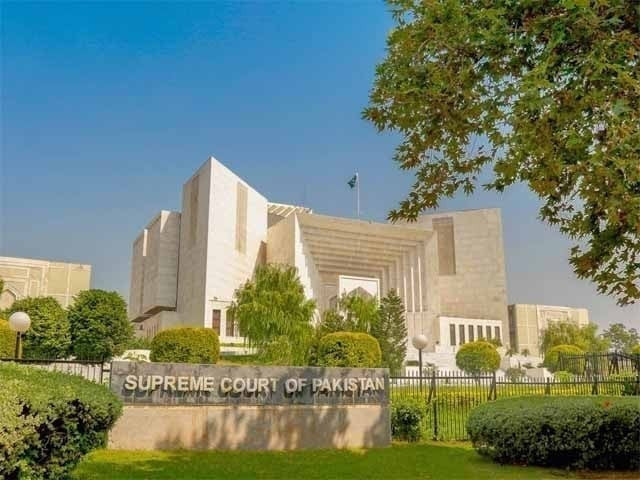SC to review judges accountability verdict
Asks AGP to suggest names of legal experts to assist the court

The Supreme Court has accepted an intra-court appeal (ICA) filed by the federal government against an apex court order that stated that the Supreme Judicial Council (SJC) could not conduct misconduct proceedings against retired judges of superior courts.
A five-member larger bench, led by Justice Aminuddin Khan, heard the ICA. The court decided to appoint amici curiae in the case and asked Attorney General for Pakistan (AGP) Mansoor Awan to suggest names.
Civil society activist Afiya Shehrbano Zai had filed a complaint against former chief justice of Pakistan (CJ) Mian Saqib Nisar under Article 209 of the Constitution, dealing with misconduct by superior court judges, over an alleged breach of the judges’ code of conduct.
However, a division bench of the Supreme Court, comprising Justice Ijazul Ahsan and Justice Munib Akhtar, set aside the complaint on June 27, 2023, declaring that judges who retire or resign do not fall within the ambit of Article 209.
Last month, on January 23, the federal government filed an appeal against the SC ruling. In its appeal, the government requested the court to set aside the verdict in the Afiya Shehrbano Zia case.
This development occurred against the backdrop of the resignation of Supreme Court judge Sayyed Mazahar Ali Akbar Naqvi, who relinquished his post on January 10 as the SJC was about to conclude its misconduct proceedings against him.
A day after his resignation, another senior SC judge, Ijazul Ahsan, resigned reportedly ahead of the filing of a similar reference against him.
The appeal argued that the SC’s June 27 verdict failed to distinguish the consequences upon resignation of a judge under Article 206, retirement under Article 179, and removal under Article 209.
“The judgment has rendered the functionality of the SJC redundant by making Article 209 inapplicable to a judge who has retired or resigned while inquiry proceedings were pending against him and/or a show-cause notice has been issued to him,” it said.
During Monday's hearing, the AGP noted that according to the Afiya Shehrbano case verdict, the Supreme Court can neither issue directives to the SJC nor regulate it.
Read: CJ says judges are undeterred by criticism
“The federal government agrees with this part of the verdict that the Supreme Court cannot give directives to the SJC. However, an ongoing SJC inquiry cannot be concluded solely on the basis that the judge has retired or resigned.
“This is not just an issue of judges' pensions but rather a matter of public trust, transparency, and accountability in the judiciary,” he said.
Justice Irfan Saadat Khan observed that there were some judges who might be directly affected by this appeal. "Whether they should be issued notices or not," he questioned. “Shouldn’t these judges be given the right to defense?”
Justice Mussarat Hilali asked whether this recent case is regarding the two SC judges who recently resigned or is it about the future.
Justice Jamal Khan Mandokhail stated that the present case is not about any specific judge but relates to a principle. “If the SJC proves misconduct against a judge, what will be the legal consequences? Judges are not above the law, but they have certain constitutional protections.”
Justice Mandokhail noted that complaints full of baseless allegations are filed against judges. These complaints are followed by a social media campaign in which the same allegations are repeated, he said.
Justice Hasan Azhar Rizvi remarked that when some honest judges deliver judgments, blackmailers file complaints against them. He asked what actions bar councils take against the lawyers who file such complaints. The court later adjourned till February 19.



















COMMENTS
Comments are moderated and generally will be posted if they are on-topic and not abusive.
For more information, please see our Comments FAQ